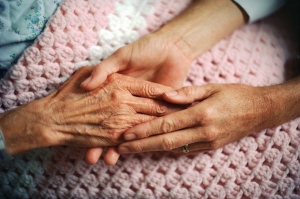Ethical issues at the end of life
Research news
If there is one certainty in life, it is that we are all fated to die.
Less certain is when, where, how and under what circumstances a person’s life will end and whether our social and cultural institutions are up to the task of ensuring a "peaceful death" at the end-of-life.
The uncertainties that surround end-of-life have moral and profound implications for practice and policy in health care.
Just what these implications are and how they might best be addressed is the focus of a conference being co-hosted by Deakin University’s Centre for Quality and Patient Safety Research (Health Care Ethics and Policy Development program) and Deakin University’s School of Nursing and Midwifery in collaboration with the International Centre for Nursing Ethics (ICNE).
Key issues to be addressed include:
- Nurse-administered palliatives sedation
- Moral risk and moral luck in end-of-life decision making
- Cross-cultural considerations
- Evidence-based ethics in healthcare policy and practice
Key speakers include Deakin Professor Megan-Jane Johnstone on the topic of: 'Moral risk, moral luck and moral safety in end-of-life decision-making: the challenge of uncertainty'
Professor Johnstone is Professor of Nursing in the School of Nursing and Midwifery, and Director of the Centre for Quality and Patient Safety Research at Deakin University, Melbourne.
She is renowned internationally for her scholarly research in the areas of nursing and health care ethics, with a particular focus on health and human rights, cross-cultural ethics, patient safety ethics, professional conduct, and end-of-life ethics including end-of-life decision-making in an aging society.
Among her many roles, Professor Johnstone is currently serving as a nominated Consultant (Ethics and Human Rights) to the International Council of Nurses, Geneva and a member of the Governing Council of the International Centre for Nursing Ethics (Surrey, UK).
She has also previously served as an invited member of the Australian Commission on Safety and Quality in Health Care, National Patient Charter Reference Group (2007-2008) and as an invited Opinion Leader, Palliative Care Australia, National End of Life Care Framework Forum (2009-2010).
Professor Johnstone has published many journal articles, book chapters and commentaries on nursing and health care ethics, and is the author of several books, including the internationally acclaimed: Bioethics a nursing perspective (Elsevier Science, released as a fifth revised edition in 2009), Nursing and the injustices of the law (WB Saunders/Bailliere Tindal 1994), and the ICN commissioned text Ethics in nursing practice: a guide to ethical decision making (2008), (co-authored with Sara T. Fry).
Professor Johnstone writes a bi-monthly column on nursing ethics for the Australian Nursing Journal and is also the author of a new book (due April 2013), titled: Alzheimer's disease, media representations and the politics of euthanasia: constructing risk and selling death in an aging society (by Ashgate, Surrey).
Share this story
 The uncertainties that surround end-of-life have moral and profound implications for practice and policy in health care.
The uncertainties that surround end-of-life have moral and profound implications for practice and policy in health care.
